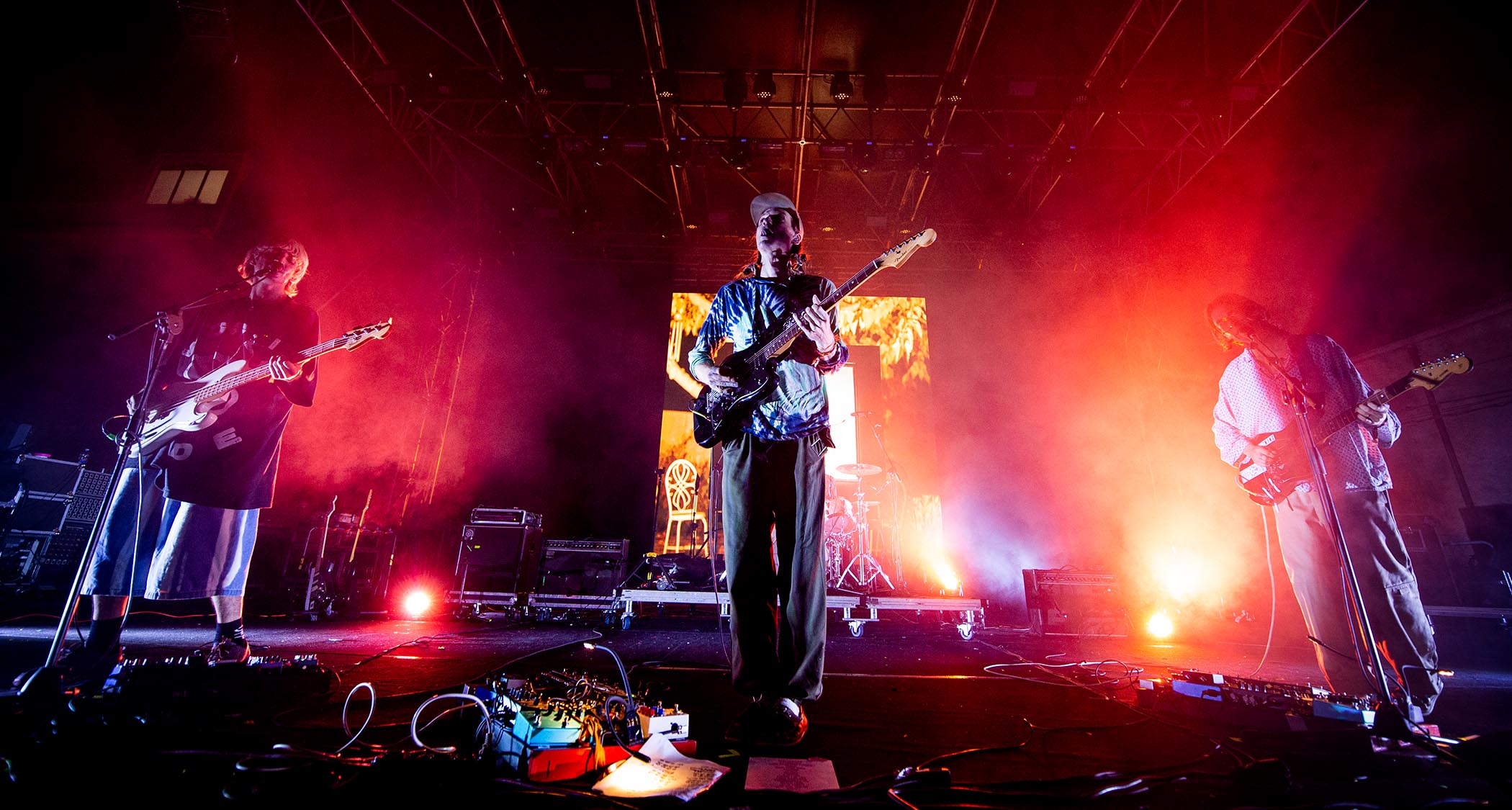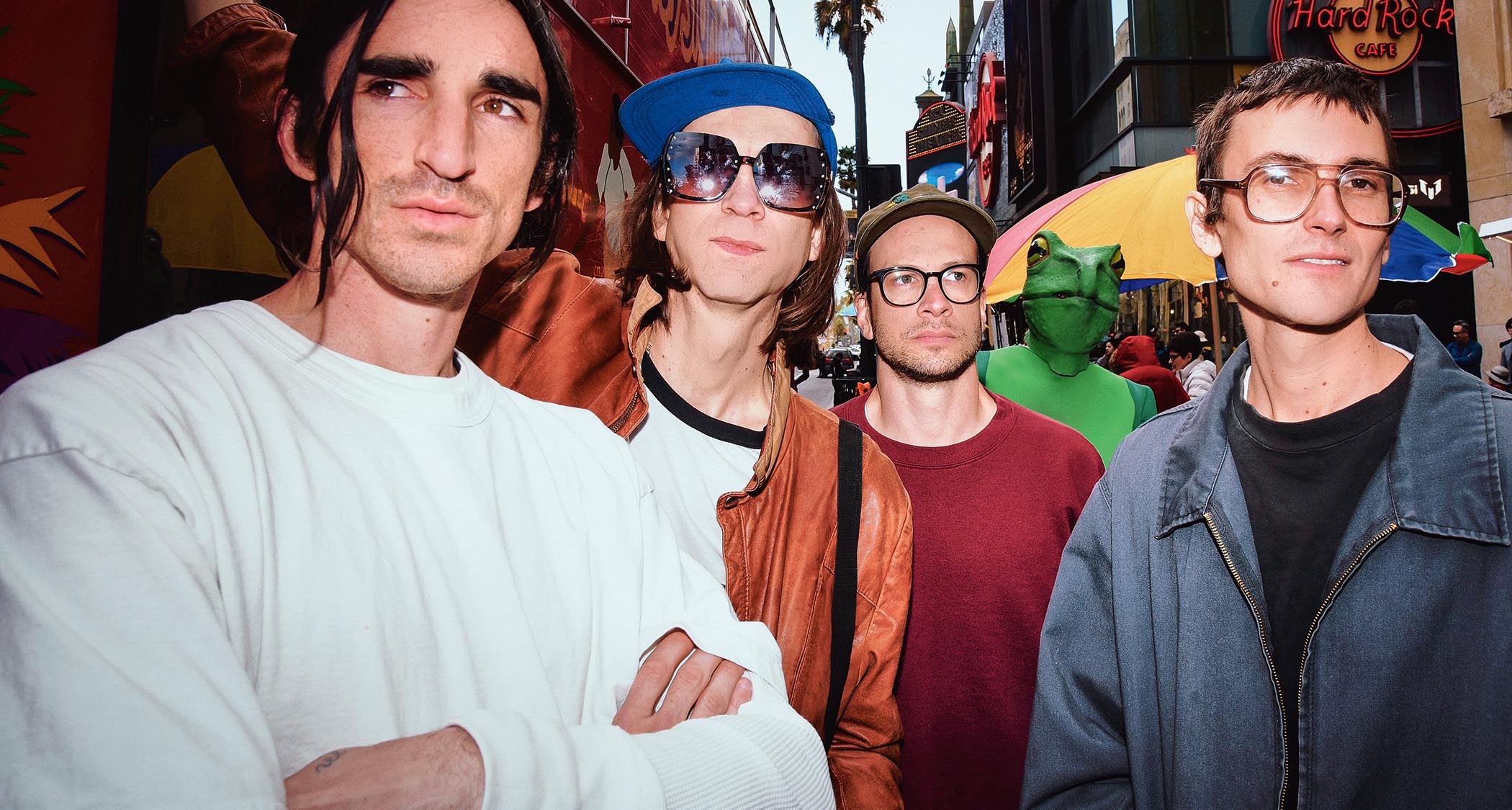“We face our amps backwards so that they can be as loud as possible. Feedback is really important to us”: DIIV are reimagining shoegaze with cheap pedals, communal gear and all-encompassing distortion
Melding dirt boxes and cranked amps with loops and drum machines, the NY rock group are not playing around as they steer shoegaze into bold new soundscapes

Despite being hailed as modern day shoegaze luminaries, New York-based band DIIV never felt that they became fully immersed in that scene until they wrote and recorded their 2019 album Deceiver.
The creation of its follow up, meanwhile, saw the band embark on a four-year challenge to push their sound – and themselves – to new heights by reaffirming what it is that defines the DIIV sound.
The result, fourth album Frog In Boiling Water, glistens with evolution and invention; floating yet haunted guitar lines, ethereal textures and weighty introspection permeate its 10 tracks.
So, as the band’s tour bus pulled into a suspiciously rain-free Manchester, Total Guitar caught up with guitarists Zachary Cole Smith (known ubiquitously as Cole) and Andrew Bailey to discover how their sonic explorations shaped the new record, and what this means for their extensive pedal collections…
How did the writing process for Frog In Boiling Water differ from Deceiver?
Andrew: “With Deceiver, we knew exactly what type of record we wanted to make; we were all painting with the same approved colours. With this one, we were constantly asking, ‘What about this other colour?’
Cole: “Adding new colours to the palette was the fun part, but a huge lesson that we learned was that removing stuff and focusing the record is really hard. There’s only really so much space in the songs, so we did equal parts adding and subtracting.”
Get The Pick Newsletter
All the latest guitar news, interviews, lessons, reviews, deals and more, direct to your inbox!
What were the key additions?
Cole: “At the core of it, we’re a live band. But at certain points throughout making the record we decided to abandon that. We asked, ‘What’s a live band without an audience?’ So we started working with drum machines, samples and loops. It felt very anachronistic.”

Did that mean buying new gear?
Cole: “Buying new toys is fun, but we’re not a band that has tons of money, so only one or two new things will enter the fray with each new album. For this one it was a Tascam Portastudio MK One four-track cassette recorder, and a Roland SP 404 sampler.”
Andrew: “Ben [Newman, drummer] put me onto the Tascam; it’s the only one they made that has the slow playback speed option and the speed wheel, and it’s my new favourite toy.
“You can bring down the first two tracks and bring up the third and fourth tracks so it plays the other side of the tape in reverse. Then you can slow it back down and get some weird sounding sh*t!”
How has your sonic experimentation impacted your live rig?
Cole: “We’ve started using the RJM Mastermind PBC/10 effects switcher which allows us to give our pedals MIDI parameters. The goal is to not have to touch pedals at all. We want as many pedals that can be MIDI controlled as possible.
Half of my board is distortion and gain pedals – I have a Rat distortion, a Fulltone OCD overdrive, an Earthquaker Devices Gray Channel and a Boss OD-200
Cole
“We both use the Strymon Timeline and Big Sky as our delays and reverbs, and it will send the tempos and presets of each song to the pedals. That gives us a lot of flexibility in terms of not having to tap out tempos and tweak settings by hand between every song.
“Half of my board is distortion and gain pedals – I have a [ProCo] Rat distortion, a Fulltone OCD overdrive, an Earthquaker Devices Gray Channel and a Boss OD-200. [Hybrid Drive]. The Mastermind became really useful for controlling those, too.”
Andrew: “I miss my Gray Channel, but I’ve replaced it with the Rat and OD-200 as I found sounds in there that are comparable. I also have the Chase Bliss Pre-amp MKII which is all over the new record. It’s all MIDI, so I can tap my foot on the chorus preset and I watch all the little faders go up and down. It’s mad!”
How much of your writing comes with the aid of effects, and how much is about writing the core idea and then adding the effects later on?
Cole: “I think it should be, and usually is, pedal first for us, because pedals can affect your playing so much. DIIV started as a template and we’ve always written within the effects chain to achieve that sound. If there’s something you want to be in the final song and you have an idea for it, you want to add those effects in as soon as you can.”
There’s a song, Little Birds, and the hook is all harmonics but it’s played through a pedal set at an octave down. It gave it a really dark, underwater, kind of confusing sound
The record’s lyrics are pretty dark and existential. Did you dial in your effects to mirror that darkness?
Cole: “Definitely, yeah. There’s a song, Little Birds, and the hook is all harmonics but it’s played through a pedal set at an octave down. It gave it a really dark, underwater, kind of confusing sound. I remember being in the studio and the producer [Chris Cody] saying it sounded better in the regular octave, but I was like, ‘Sorry, man, no!’
“With the distortions, we referenced bands like Jesu a lot for that really thick, dark and all-encompassing sound. Ultimately it was about what served the song, so ideas evolved, but we wanted to make a really dark ‘headphone record’ with a lot of stuff to listen to and suck you in.”
What are two pedals you couldn’t live without?
Cole: “The secret weapon for the whole record was the Boss SD-1 Super Overdrive, so I’d say that. I got one for my 16th birthday and it sounds so good for clean boosts or a really dirty overdrive. It’s the simplest pedal but in my mind it wins every shoot-out we do with it.”
Andrew: “For me it’s the Behringer Delay/Reverb D400. I don’t use it in DIIV anymore, but I did do for about 10 years. When I’m back in New York I play in a bunch of smaller bands just for fun, and I always take that with me.
“I had a friend who worked in a music store and whenever he got in a Behringer pedal, it was mine, and I was getting them for $5 or $10. It felt like a hack. They’re as good as the Boss ones, but just housed in plastic. I’ve rocked that one pedal for over a decade and it’s never crapped out.”
What guitars are you putting through those pedals?
Cole: “We normally do a lot of shoot-outs in the studio, but Chris Cody wanted us to use our main guitars as he felt they were special to us. I play a Blacktop HH Fender Cyclone. There’s something so special about that series. It doesn’t matter what model it is – if it’s a Blacktop HH then it’s perfect for me. They’re workhorses and they’re really consistent, which is a really important part for live guitars.”
Andrew: “I play a Jazzmaster that Cole originally bought…”
Cole: “…Because I needed a guitar with a whammy bar and it was cheap. Then it entered the mix of DIIV guitars. We’re a very communal band where, similar to ideas, once a piece of gear enters the fray it becomes a free-for-all.”
With you using so many pedals, what do you look for in a guitar amp?
Cole: “For years we used a Roland Jazz Chorus because it’s a keyboard amp so it’s really clear. But when we started moving to pedal distortions we found it didn’t work. It was really hard to find an amp that did both. Then I inherited a Reeves amp, which is like basically a Hiwatt clone, and it was so loud and clean and it handled pedals so well, so we’ve made the jump to Hiwatt.
“I use a Custom 50 and Andrew’s on the 100 watt version. Both are closed-back for extra bass and resonance. We used a Fender Vibrolux and a Blues Junior a lot on the record, but the Hiwatt is a good all-rounder for live. We face our amps backwards so that they can be as loud as possible. Feedback is really important to us.”
How does it feel to have had such an influential impact on modern shoegaze?
Cole: “It’s mind-blowing any time somebody tells you that your band influenced them, but we didn’t invent shoegaze. It’s been around for a long time, and that forces innovation. You can’t recreate My Bloody Valentine or Slowdive because that sound has been perfected already.”
I had a friend who worked in a music store and whenever he got in a Behringer pedal, it was mine, and I was getting them for $5 or $10. It felt like a hack
Andrew: “I wouldn’t have called our first two albums shoegaze, but I think we created a pretty unique sound that a lot of people have f*cked with. But since we did a shoegaze album, I don’t hear that sound in other bands as much, and when I do I think of it more that they’re referencing the same bands as we do.
“At our show in London there were three generations of shoegaze bands backstage. Andy [Bell, guitarist/vocalist] from Ride was the legend in the room and someone who can be credited with creating that sound. So we’re looking up to Andy, and bdrmm, who are supporting us on this tour and cite us as an influence, are looking up to us. It was trippy!”
- Frog in Boiling Water is out now via Concord.
A freelance writer with a penchant for music that gets weird, Phil is a regular contributor to Prog, Guitar World, and Total Guitar magazines and is especially keen on shining a light on unknown artists. Outside of the journalism realm, you can find him writing angular riffs in progressive metal band, Prognosis, in which he slings an 8-string Strandberg Boden Original, churning that low string through a variety of tunings. He's also a published author and is currently penning his debut novel which chucks fantasy, mythology and humanity into a great big melting pot.
“It holds its own purely as a playable guitar. It’s really cool for the traveling musician – you can bring it on a flight and it fits beneath the seat”: Why Steve Stevens put his name to a foldable guitar
“Finely tuned instruments with effortless playability and one of the best vibratos there is”: PRS Standard 24 Satin and S2 Standard 24 Satin review

















